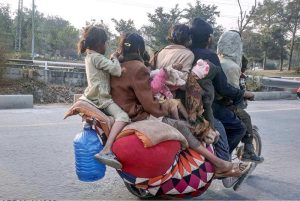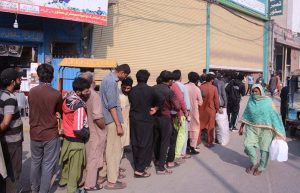ISLAMABAD, Dec 11 (APP):The Institute of Strategic Studies Islamabad (ISSI) and Civil Society Coalition for Climate Change (CSCCC) with support of the Embassy of France in Pakistan, on Thursday convened a high-level Post-COP30 Dialogue titled “From Paris to Belem Ten Years After the Paris Agreement: The Road Travelled and the Journey Ahead.”
The key speakers at the event were Ms. Aisha Humera Moriani, Secretary, Ministry of Climate Change & Environmental Coordination; H.E. Mr. Nicolas Galey, Ambassador of France to Pakistan; Ambassador Nabeel Munir, Special Secretary (UN), Ministry of Foreign Affairs; Ms. Aisha Khan, Chief Executive, Civil Society Coalition for Climate Change (CSCCC); Dr. Abid Sulehri, Executive Director, Sustainable Development Policy Institute (SDPI), and Mr. Hiz Jamali, Senior Climate Change Officer, Asian Development Bank, said a press release.
Opening the session, Dr. Neelum Nigar welcomed the participants and said today’s dialogue is convened to reflect on a decade of climate progress and the urgent work ahead for vulnerable countries like Pakistan. She emphasized that COP30’s outcomes highlight the need for sustained commitment, cooperation, and informed action.
Director General ISSI Ambassador Sohail Mahmood, in his welcome remarks, noted that the deliberations at COP30 in Belem took place amid a deeply strained multilateral climate landscape. He observed that while the meeting helped reaffirm the indispensability of global cooperation, it also laid bare the widening gaps between ambition and delivery particularly on finance, just transitions, and challenges in the operationalisation of Loss and Damage Fund. Ambassador Sohail Mahmood highlighted that Pakistan, despite contributing less than one percent to global emissions, remains among the most climate-vulnerable nations, as evidenced by repeated floods and extreme weather events. He called for accessible, predictable and grant-based climate finance and urged the international community to support climate-vulnerable states through solidarity and long-term partnerships.
Ms. Aisha Khan, in her opening intervention, underscored the need to anchor climate discourse in evidence, equity and national preparedness. She reminded participants that ten years after Paris, the world stands at a critical juncture where progress cannot be celebrated without acknowledging persistent gaps in ambition, delivery and political will. She stressed that Pakistan’s climate narrative must now transition from reactive crisis-response to proactive planning grounded in resilience, data, and regional collaboration. Welcoming the shift from a pre-COP to a post-COP format this year, she noted that reflection, honest appraisal and collective learning were essential for shaping Pakistan’s position for COP31 and future negotiations.
Delivering her Keynote Address, Secretary MoCC Aisha Humera Moriani positioned COP30 as a crucial implementation COP. She outlined Pakistan’s submission of NDC 3.0, a more ambitious and consultative national document extending to 2035. She stressed that the crisis in global ambition stems not from inadequate NDC pledges but from weak ambition in the means of implementation the finance, technology and capacity-building required for meaningful action. She warned that climate impacts ranging from glacial melt to extreme floods are accelerating at a pace that threatens Pakistan’s food security, water systems, infrastructure, and public health. Adaptation finance, she maintained, must be grant-based, as borrowing for climate resilience would push vulnerable countries deeper into debt. She welcomed the operationalisation of the Loss and Damage Fund but emphasised the need for significant capitalisation, direct access modalities, and simplified procedures. Ms. Moriani also underscored the need for joint research initiatives, university partnerships, and provincial leadership, noting that several sub-national governments showcased impactful work at COP30.
The Guest of Honour, Ambassador Nicolas Galey delivered a compelling assessment of the global climate landscape. Marking the 10th anniversary of the Paris Agreement, he observed that the world is no longer united in its understanding of scientific facts, let alone in its commitment to shared action. With the 1.5°C threshold already breached in 2024, he cautioned that climate impacts are intensifying, with Pakistan repeatedly facing devastating floods and heat extremes.Despite these sobering realities, he reaffirmed France’s steadfast commitment to ecological transition and climate justice. He highlighted France’s legal commitment to carbon neutrality by 2050, a 19 percent reduction in national emissions since 2017, and sustained annual climate financing exceeding €6 billion for developing countries. He praised ongoing partnerships in Pakistan including gender-focused climate initiatives and encouraged continued collaboration with government, academia and civil society.
Ambassador Nabeel Munir offered a strategic overview of COP30 outcomes, describing Belem as emblematic of widening global divides. He noted that COP30 acknowledged, for the first time, the real possibility of a temperature overshoot. While he welcomed the decision to triple adaptation finance by 2035, he highlighted gaps in timelines, definitions and baselines. Pointing to Pakistan’s ambitious NDC 3.0 targets including a 50% emissions reduction pathway by 2035 he stressed that national ambition cannot be sustained without accessible finance and affordable technology. He reiterated Pakistan’s longstanding position that adaptation finance must be grant-based, warning that concessional loans are neither viable nor sustainable for countries already facing acute climate-induced fiscal pressures.
During the panel discussion, Dr. Abid Suleri situated COP30 within the broader trajectory from Kyoto to Paris and now Belem, noting that despite developing countries’ willingness to cut emissions through NDCs, progress is hindered by inadequate climate finance, geopolitical gridlock, and uneven burden-sharing. He underscored the need for bottom-up climate governance, where district-level inputs shape provincial and national commitments, and called for a regional “coalition of the willing” in South Asia to address shared ecological challenges.
Adding a finance perspective, Mr. Hiz Jamali stressed that the key constraint is often implementation rather than the availability of funds, pointing to slow disbursements and project delivery gaps. He highlighted how development banks increasingly use blended finance, regional approaches and private-sector mobilisation, and emphasized that bankable project design, strong execution capacity and transparent monitoring are essential for Pakistan to unlock larger flows of climate and resilience financing.
The dialogue concluded with an interactive session, where participants reflected on how Pakistan can strengthen domestic capacity while navigating an increasingly complex climate governance landscape.
Speakers emphasized that the 10th anniversary of Paris Agreement is a moment not only for reflection but for renewed ambition, deeper institutional collaboration and sustained climate diplomacy. At the close of the event, Ambassador Khalid Mahmood, Chairman BoG, ISSI, delivered the vote of thanks and presented the Institute’s mementos to the distinguished speakers and participants.








